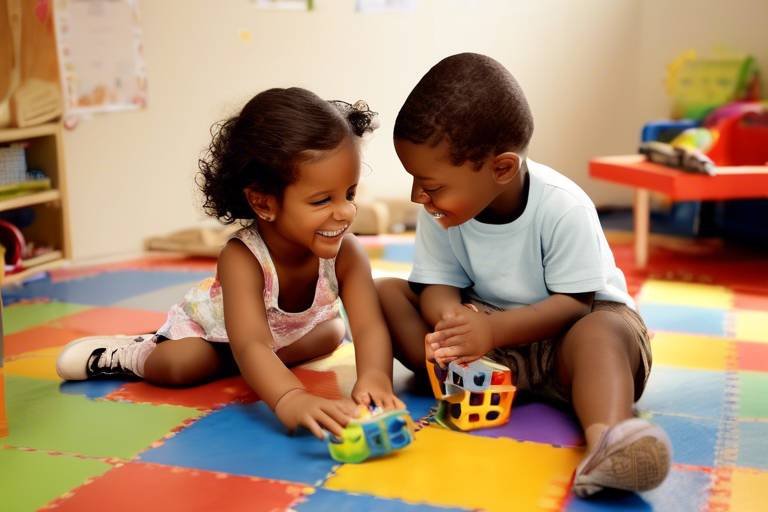Understanding the Impact of Family Rules on Kids
Family rules play a crucial role in shaping the behavior and development of children. They act as a guiding light, helping kids navigate the sometimes murky waters of social interactions and personal conduct. Think of family rules as the framework of a house; without a solid structure, everything can come crashing down. These rules not only set boundaries but also create a sense of security that children desperately need as they grow and explore the world around them. But what really happens when families establish these rules? Let’s dive deeper into the impact they have on our little ones.
At their core, family rules are essential for healthy development. They provide children with a clear understanding of what is expected of them, which in turn fosters a sense of discipline and responsibility. Imagine a child who knows that they must complete their homework before heading out to play; this simple rule instills a sense of accountability. It teaches them that actions have consequences, and that adhering to guidelines can lead to positive outcomes. This understanding is vital as they transition into adulthood, where rules and regulations are part of everyday life.
Moreover, the significance of family rules extends beyond mere discipline. They also play a pivotal role in fostering strong relationships within the family unit. When rules are established collaboratively, it encourages open communication and mutual respect among family members. Children learn to express their opinions and understand that their voices matter, which is a valuable lesson that transcends family life. It’s like planting seeds in a garden; with the right nurturing, those seeds can grow into strong, healthy plants that withstand the storms of life.
However, it’s important to recognize that not all rules are created equal. Some rules may resonate positively with children, while others might feel restrictive or unfair. This brings us to the delicate balance that parents must strike between maintaining structure and allowing flexibility. After all, children are not robots; they are individuals with unique personalities and needs. By understanding the impact of family rules, parents can create an environment that promotes growth, learning, and emotional well-being.
In the following sections, we will explore various types of family rules, their consequences, and the importance of adapting them as children grow. We’ll also delve into how involving children in the rule-making process can foster a sense of ownership and respect. So, buckle up, because the journey into the world of family rules is about to get interesting!

The Importance of Family Rules
Family rules are like the invisible threads that weave the fabric of a household. They establish boundaries and set clear expectations for behavior, creating a safe environment where children can thrive. Imagine trying to navigate a ship without a compass; without rules, children may feel lost and uncertain about what is acceptable behavior. These rules provide a sense of security, allowing kids to explore their world while knowing there are limits to protect them.
Moreover, family rules play a crucial role in fostering discipline and responsibility. When children understand the consequences of their actions, they learn to make better choices. For instance, if a child knows that their screen time is limited to one hour a day, they are more likely to manage their time wisely. This not only helps them develop self-regulation but also teaches them the importance of accountability for their actions.
It's fascinating to consider how these rules can shape a child's development. Research shows that children raised in structured environments tend to exhibit better emotional regulation, higher academic performance, and improved social skills. Rules can also enhance family bonding; when everyone adheres to the same standards, it creates a sense of unity. For example, having a rule about family dinners can promote communication and strengthen relationships among family members. In this way, rules are not just restrictions; they are tools that help build a cohesive family unit.
However, it's essential to strike a balance. While rules are necessary, they should not feel like shackles. Parents must ensure that their children feel comfortable discussing the rules and expressing their feelings about them. This openness can lead to a more harmonious household where children feel valued and respected. In this regard, rules should be viewed as guidelines rather than rigid laws, allowing for flexibility as children grow and their needs change.
In summary, family rules are vital for establishing a nurturing environment. They help children understand boundaries, foster discipline, and encourage responsibility. By creating a structured yet flexible atmosphere, parents can equip their children with the skills they need to navigate life's challenges. So, the next time you set a rule, remember that you're not just enforcing a guideline; you're helping to shape a future.

Types of Family Rules
Family rules can take on many forms, each serving a unique purpose in shaping a child's behavior and overall development. They act as a guiding framework that not only helps children understand what is expected of them but also instills values that will last a lifetime. These rules can be broadly categorized into several types, each addressing different aspects of family life and individual growth.
One of the most common types of family rules are behavioral rules. These rules are crucial in teaching children how to interact with others, both within the family and in broader social settings. For instance, rules about using polite language, sharing, and taking turns are fundamental in fostering respect and empathy. Imagine a household where siblings are encouraged to express their feelings openly and resolve conflicts through dialogue rather than shouting. This kind of environment not only nurtures cooperation but also prepares children for healthy relationships outside the home.
Another significant category is household responsibilities. Assigning chores to children, such as setting the table, cleaning their rooms, or helping with grocery shopping, teaches them accountability and the importance of contributing to the family unit. When children participate in household tasks, they develop a sense of belonging and pride in their contributions. It’s like being part of a team where everyone has a role to play. Moreover, these responsibilities can be age-appropriate, allowing children to gradually take on more complex tasks as they grow.
In addition to behavioral and responsibility rules, there are also academic rules. These guidelines encourage children to prioritize their education and establish good study habits. For example, a family may set rules about designated homework times, limiting screen time during school nights, or requiring daily reading. By instilling these academic expectations, parents help their children understand the value of education and self-discipline, which are essential for future success.
Moreover, social rules play a vital role in helping children navigate friendships and peer relationships. Rules such as being kind to others, not interrupting when someone else is speaking, and respecting personal space are essential for developing strong social skills. When children learn to respect these social norms at home, they are more likely to carry these lessons into their interactions outside the family, fostering healthier friendships and social connections.
Ultimately, the effectiveness of family rules hinges on their clarity and consistency. It’s important for parents to communicate these rules clearly and ensure that they are applied consistently. This creates a stable environment where children know what to expect, reducing anxiety and confusion. Think of family rules as the foundation of a house; without a strong foundation, the structure may crumble. Similarly, without clear and consistent rules, children may struggle to understand their boundaries and expectations.
In conclusion, family rules encompass a wide range of expectations that guide children in various aspects of their lives. From behavioral and household responsibilities to academic and social rules, each type plays a critical role in shaping a child's character and preparing them for the world. By setting thoughtful and age-appropriate rules, parents can help their children grow into responsible, respectful, and well-rounded individuals.

Behavioral Rules
Behavioral rules are like the compass that guides children through the often perplexing world of social interactions and personal conduct. Think of them as the unwritten laws of the playground, the essential guidelines that help children navigate friendships, respect boundaries, and understand the importance of empathy. When children are taught to adhere to these rules, they learn not just how to behave, but also how to connect with others in meaningful ways. For instance, a simple rule like "always say please and thank you" can instill a sense of gratitude and consideration in a child, laying the foundation for strong, respectful relationships throughout their lives.
These rules can cover a wide array of behaviors, such as:
- Respecting others' personal space
- Listening when someone else is speaking
- Taking turns during games
- Expressing feelings appropriately
By understanding and practicing these behavioral rules, children can develop essential social skills that will serve them well into adulthood. Moreover, they learn to appreciate the perspectives of others, fostering a sense of community and cooperation among siblings and peers. It's like planting seeds of respect and kindness that will blossom into strong interpersonal relationships as they grow.
However, it's important to remember that the enforcement of these rules should be balanced with understanding and compassion. Children are not perfect, and they will inevitably make mistakes. Instead of reacting with frustration when a rule is broken, parents can use these moments as teaching opportunities. For example, if a child interrupts during a conversation, rather than scolding them harshly, a parent might gently remind them of the importance of waiting their turn to speak. This approach not only reinforces the behavioral rule but also models respectful communication.
In addition, behavioral rules can also help children learn about the consequences of their actions. When they understand that their behavior affects others, they become more mindful and considerate. This understanding can be reinforced through discussions about feelings and the impact of their actions. For instance, asking a child how they would feel if someone interrupted them can help them empathize with their peers and adjust their behavior accordingly.
Ultimately, establishing and maintaining behavioral rules is crucial for fostering a nurturing environment where children can thrive. When children feel secure in knowing what is expected of them, they are more likely to exhibit positive behaviors and develop healthy relationships. So, as parents, it’s essential to communicate these rules clearly, model the behaviors you wish to see, and create an atmosphere where children feel safe to express themselves while learning to respect the boundaries of others.
- What are behavioral rules? Behavioral rules are guidelines that help children understand how to interact socially and behave appropriately in various situations.
- Why are behavioral rules important? They are important because they teach children respect, empathy, and cooperation, which are essential skills for building healthy relationships.
- How can parents effectively teach behavioral rules? Parents can effectively teach these rules by modeling appropriate behavior, discussing the importance of these rules, and using real-life situations as teaching moments.
- What should parents do if a child breaks a behavioral rule? Instead of reacting negatively, parents should use it as a learning opportunity, discussing the behavior and its impact on others.

Consequences of Violating Rules
Understanding the consequences of violating family rules is crucial for both parents and children. When kids break the rules, it’s not just about punishment; it's an opportunity for learning and growth. Appropriate consequences can reinforce the idea that actions have repercussions, while excessive punishment can lead to feelings of resentment and rebellion. Think of it like a game of chess—every move has a consequence, and understanding that can help children navigate their choices more wisely.
When a child breaks a rule, it’s essential to respond in a way that teaches rather than punishes. For example, if a teenager comes home late, instead of launching into a lecture, a parent might say, “I understand you wanted to have fun with your friends, but coming home late affects not just you but the whole family.” This approach encourages children to think about how their actions impact others, fostering empathy and responsibility.
Here are some effective ways to handle rule violations:
- Natural Consequences: Allow children to experience the natural consequences of their actions. If they forget their homework, they may face a lower grade, teaching them the importance of responsibility.
- Logical Consequences: Implement consequences that are directly related to the violation. For example, if a child refuses to clean their room, they may lose privileges to play video games until the task is completed.
- Discussion and Reflection: After a rule is broken, sit down with your child and discuss what happened. Ask questions that guide them to reflect on their choices and the consequences that followed.
It’s also vital to maintain a consistent approach. If rules are enforced sporadically, children may become confused about expectations. This inconsistency can lead to frustration for both parents and kids. A good rule of thumb is to establish clear guidelines about what will happen if rules are broken, ensuring that consequences are fair and predictable.
Moreover, it’s crucial to recognize that not all violations warrant the same response. A small infraction, like leaving toys out, might be addressed with a gentle reminder, while more serious issues, such as dishonesty, may require a more serious discussion about values and trust. Tailoring responses to the severity of the violation not only helps maintain respect in the parent-child relationship but also aids in the child’s understanding of the gravity of their actions.
Ultimately, the goal of discussing the consequences of violating family rules is to guide children toward making better choices in the future. By fostering a supportive environment where children feel safe to express themselves and learn from their mistakes, parents can help cultivate a sense of accountability and integrity that will serve their children well throughout life.
Q: What should I do if my child repeatedly breaks the same rule?
A: It’s important to assess why the rule is being broken. Is the rule too strict? Is there a lack of understanding? Have a conversation with your child to understand their perspective and adjust the rule or consequences if necessary.
Q: How can I make sure my child understands the consequences of their actions?
A: Engage in open discussions about the rules and their importance. Use real-life examples and encourage your child to think through scenarios where their choices could lead to different outcomes.
Q: Is it okay to change consequences based on the situation?
A: Yes! Flexibility is key. While consistency is important, being adaptable shows your child that you are willing to consider their feelings and the context of their actions.

Positive Reinforcement Techniques
When it comes to shaping behavior, positive reinforcement is like a secret weapon for parents. It’s all about catching your kids being good and rewarding them for it! Imagine this: instead of focusing on what they did wrong, you shine a spotlight on their good choices. This not only boosts their self-esteem but also encourages them to repeat those behaviors. Think of it as planting seeds of positivity in their minds. When they feel appreciated, they're more likely to bloom into responsible, caring individuals.
So, how can you effectively implement positive reinforcement in your home? Here are a few techniques that can work wonders:
- Verbal Praise: A simple “Great job!” or “I’m so proud of you!” can work miracles. Kids thrive on affirmation, and your words can motivate them to strive for more.
- Reward Systems: Consider establishing a reward chart. For every good deed or behavior, they earn a star or sticker. Once they accumulate a certain number, they can trade them in for a special treat or privilege. This not only makes it fun but also teaches them about goal-setting.
- Quality Time: Sometimes, the best reward is simply spending time together. Whether it’s a movie night or a trip to the park, these moments of connection can be more valuable than any material reward.
But wait, there’s more! The impact of positive reinforcement goes beyond just immediate behavior changes. It can significantly enhance a child's self-esteem and motivation. When children receive praise, they start to associate their efforts with positive outcomes, which can fuel their desire to tackle new challenges. It’s like giving them a little boost of confidence, encouraging them to take risks and explore their capabilities.
However, it’s important to strike a balance. Over-praising can lead to kids seeking validation for everything they do, which isn’t ideal either. Instead, focus on specific behaviors. For example, instead of saying “You’re the best!” you might say, “I really liked how you shared your toys with your friend today.” This helps them understand exactly what they did right, reinforcing the behavior without creating an expectation of constant praise.
In conclusion, positive reinforcement techniques are not just about rewards; they’re about building a nurturing environment where children feel valued and understood. By celebrating their achievements, no matter how small, you’re not just shaping their behavior—you’re helping them grow into confident, responsible individuals who know the power of kindness and cooperation. So, the next time your child does something commendable, remember to recognize it. You might just be surprised at how much it inspires them to keep shining!
Q: What is positive reinforcement?
A: Positive reinforcement is a technique used to encourage desired behaviors by offering rewards or praise when those behaviors occur. It helps children associate good actions with positive outcomes.
Q: Can positive reinforcement be overdone?
A: Yes, over-praising can lead to children expecting rewards for every little action. It’s best to focus on specific behaviors and provide praise that is genuine and meaningful.
Q: How does positive reinforcement affect a child's self-esteem?
A: When children receive positive feedback for their actions, it boosts their self-esteem and encourages them to continue making good choices. They learn that their efforts are valued and appreciated.
Q: What are some examples of positive reinforcement?
A: Examples include verbal praise, reward systems like sticker charts, and spending quality time together as a family when children exhibit good behavior.

Household Responsibilities
Assigning to children is not just about getting chores done; it's a vital part of their growth and development. When kids are involved in daily tasks, they learn the importance of accountability and teamwork. Imagine a family as a small community where everyone has a role to play. Just like in a sports team, each player contributes to the overall success of the game. Similarly, when children take on responsibilities at home, they feel they are an integral part of the family unit, which fosters a sense of belonging and pride.
Involving kids in household chores can significantly boost their self-esteem and teach them valuable life skills. For instance, when a child helps set the table or tidies up their room, they not only contribute to the family’s well-being but also gain a sense of accomplishment. It's like planting seeds in a garden; with time and care, those seeds grow into something beautiful. Here are some key benefits of assigning household responsibilities:
- Life Skills Development: Children learn essential skills like cooking, cleaning, and organizing.
- Teamwork: Working together on chores teaches cooperation and communication.
- Confidence Building: Completing tasks successfully boosts children’s confidence and independence.
Moreover, when children see their efforts making a tangible difference—like a clean kitchen or a well-organized living room—they begin to understand the value of hard work. This realization can be quite empowering. It’s important to remember that the approach to assigning these responsibilities should be age-appropriate. For younger children, simple tasks like sorting laundry or watering plants can be a great start, while older kids might take on more complex duties like meal preparation or grocery shopping.
Another crucial aspect is the communication surrounding these responsibilities. Parents should explain the reasons behind each task and how it contributes to the family as a whole. This discussion not only clarifies expectations but also encourages children to ask questions and express their feelings about the chores assigned to them. It’s an opportunity for parents to teach their kids about time management and prioritization, which are essential skills that will serve them well into adulthood.
In essence, household responsibilities are a powerful tool for teaching children about the world around them. They learn the significance of contributing to a shared goal, which is crucial for their social development. Just as a well-oiled machine functions best when every part is in sync, a family thrives when each member plays their role effectively. So, by encouraging children to take on these responsibilities, parents are not just keeping their homes tidy; they are nurturing responsible, capable individuals ready to take on the world.
Q: At what age should I start assigning household responsibilities to my child?
A: You can start assigning simple tasks as early as age 3 or 4, such as picking up toys or helping with setting the table. As they grow, you can gradually increase the complexity of the tasks.
Q: How can I motivate my child to complete their chores?
A: Positive reinforcement works wonders! Praise them for their efforts, and consider implementing a reward system to encourage them to take their responsibilities seriously.
Q: What if my child refuses to do their chores?
A: It's important to have an open conversation about why they are reluctant. Sometimes, they might feel overwhelmed or unsure about how to complete a task. Providing guidance and support can help them overcome these feelings.

Balancing Flexibility and Structure
Finding the right balance between flexibility and structure in family rules can feel like walking a tightrope. On one side, you have the need for rules that provide a sense of order and predictability, which is essential for a child’s development. On the other side, you have the necessity for flexibility that allows children to explore their individuality and make choices. So, how can parents navigate this tricky terrain? It's all about understanding when to stand firm and when to bend a little.
Think of family rules as the framework of a house. Just like a house needs a solid foundation to stand tall, children need rules to feel secure. However, if the walls are too rigid, there’s no room for creativity or growth. For instance, a rule about bedtime is crucial for ensuring children get enough rest, but allowing some flexibility on weekends can teach them about compromise and responsibility. This balance can lead to a more harmonious household where children feel both safe and empowered to express themselves.
One effective way to achieve this balance is through open communication. Encourage your kids to share their thoughts and feelings about the rules. This not only helps them feel heard but also gives you insight into their perspective. You might be surprised at how willing they are to adhere to rules when they understand the reasoning behind them. For example, instead of a blanket ban on screen time, you might establish a guideline that allows for some flexibility based on the child’s homework and chores. This approach not only enforces structure but also respects their growing need for autonomy.
Moreover, it’s important to recognize that children are not one-size-fits-all. Each child has their own unique personality and needs, which means that the balance of flexibility and structure may differ from one child to another. For instance, a more introverted child might thrive under a stricter routine, while an extroverted child may need more leeway to explore social activities. Tailoring your approach can lead to better compliance and a more positive family dynamic.
In addition, consider implementing a system where rules can be revisited and revised. This could be a monthly family meeting where everyone can discuss what’s working and what isn’t. This not only fosters a sense of teamwork but also teaches children that rules can evolve as they grow. It’s a fantastic way to instill a sense of responsibility and ownership over their behavior, making them more likely to adhere to the established guidelines.
Ultimately, the goal is to create an environment where children can thrive. By striking the right balance between flexibility and structure, you’re not just enforcing rules; you’re equipping your children with the skills they need to navigate the world confidently. They’ll learn that while rules are important, so is the ability to adapt and make choices, which are crucial skills they will carry into adulthood.
- How can I know if my rules are too strict? Look for signs of resistance or frustration from your children. If they seem unhappy or frequently challenge the rules, it might be time to reassess.
- What are some examples of flexible rules? Rules like screen time limits can be adjusted based on homework completion or special occasions, allowing for a more adaptable approach.
- How do I involve my children in the rule-making process? Set aside time for family discussions where everyone can contribute ideas and express concerns about existing rules.
- What if my child doesn’t follow the rules? Consider whether the rules are reasonable and if the consequences are appropriate. Open dialogue can often lead to better understanding and compliance.

Adapting Rules as Children Grow
As children journey through various stages of development, their needs and abilities evolve dramatically. What worked for a toddler may not be effective for a teenager. This is why adapting family rules as children grow is crucial for maintaining a healthy family dynamic and ensuring that the rules remain relevant and constructive. Think of it like adjusting the sails of a ship; as the winds change, so too must your course to navigate the waters effectively.
When children are young, rules tend to be straightforward and focused on basic behaviors—things like sharing toys, saying "please" and "thank you," or bedtime routines. However, as they mature, the complexity of their social interactions and personal responsibilities increases. For instance, a rule about screen time may need to be revisited as a child transitions from elementary school to middle school, where social media and online interactions become more significant. In this context, parents must consider not just what the rules are, but also why they exist and how they can be adapted to fit the child's growing independence.
One effective approach to adapting rules is to involve children in the conversation. This not only empowers them but also helps them understand the reasoning behind certain guidelines. For example, you might ask your teenager how they feel about their current curfew and whether they believe it reflects their maturity level. This collaborative approach fosters a sense of ownership and respect for the rules, making it more likely that they will adhere to them.
Additionally, parents should regularly assess the effectiveness of existing rules. Have they been successful in guiding behavior? Are there any rules that seem outdated or overly restrictive? A simple way to evaluate this is through family meetings, where everyone can share their thoughts and feelings about the rules in a safe space. This practice not only enhances communication but also strengthens family bonds. It’s essential to keep in mind that flexibility doesn’t mean a lack of structure; rather, it’s about creating a dynamic environment where children feel secure yet free to express themselves.
To illustrate this concept, consider the following table that outlines how rules can evolve with age:
| Age Group | Example Rules | Adaptations |
|---|---|---|
| 3-5 years | No hitting, sharing toys, bedtime at 7 PM | Introduce concepts of empathy and emotional expression |
| 6-10 years | Homework must be completed before playtime, screen time limits | Encourage self-monitoring and responsibility for schoolwork |
| 11-14 years | Curfew at 9 PM, no phone during meals | Discuss the importance of trust and negotiate curfews based on behavior |
| 15-18 years | Respect for privacy, open communication about relationships | Shift from strict rules to guidelines, allowing for more independence |
In summary, adapting family rules as children grow is not just about changing the rules themselves but also about fostering an environment of open communication and mutual respect. By engaging children in the rule-making process and regularly reassessing the guidelines, parents can ensure that their children not only follow the rules but understand the values behind them. This approach not only helps in guiding behavior but also prepares children for the responsibilities and challenges they will face as they transition into adulthood.
- Why is it important to adapt family rules? Adapting family rules is essential to meet the changing needs and maturity levels of children, ensuring that guidelines remain relevant and effective.
- How can I involve my children in the rule-making process? You can involve your children by initiating discussions during family meetings, asking for their input on existing rules, and encouraging them to suggest new ones.
- What are some signs that a rule needs to be changed? Signs may include frequent arguments over the rule, a lack of compliance, or feedback from your child indicating that they feel the rule is unfair or outdated.

Involving Children in Rule-Making
Involving children in the creation of family rules is not just a clever parenting hack; it's a game changer! When kids have a say in the rules that govern their behavior, they are more likely to understand and respect those rules. Think about it: would you feel more inclined to follow a set of guidelines that you helped create, or one that was simply handed down to you? The answer is clear! This collaborative approach not only empowers children but also fosters a sense of responsibility and ownership over their actions.
One of the best ways to involve children in rule-making is to hold a family meeting. This can be a fun and engaging way to discuss what rules are important to everyone. During this meeting, parents can encourage children to voice their opinions and suggest rules that they think are reasonable. For instance, you might ask questions like:
- What do you think is a fair rule about screen time?
- How can we make sure everyone helps with chores?
- What are some ways we can treat each other with respect at home?
By asking these types of questions, parents not only gather valuable input but also teach children critical thinking skills. Kids learn to consider the perspectives of others and think about the implications of their suggestions. This process can be incredibly enlightening for both parents and children, as it often reveals different viewpoints and fosters a more harmonious family environment.
Moreover, when children are involved in the rule-making process, they are more likely to adhere to the rules because they feel a sense of commitment to them. This commitment can lead to better behavior and a more positive atmosphere at home. It's akin to a team working together towards a common goal; when everyone has a stake in the outcome, the motivation to succeed increases exponentially.
However, it's essential to set some boundaries during this process. While children's input is invaluable, parents should guide the discussion to ensure that the rules remain reasonable and appropriate for the family dynamic. For example, if a child suggests a rule that allows them to stay up late every night, a parent can explain why that might not be feasible while still acknowledging the child's desire for more freedom.
Involving children in rule-making not only strengthens family bonds but also prepares them for the future. They learn how to negotiate, compromise, and respect the opinions of others—skills that are crucial in adulthood. By fostering an environment where children feel heard and valued, parents lay the groundwork for healthy relationships both within and outside the family.
In summary, the act of involving children in the creation of family rules can lead to a more cooperative and respectful household. It transforms the often mundane task of rule-setting into an engaging family activity, where everyone feels valued and motivated to contribute positively. So why not gather around the dinner table, have a chat, and start crafting those family rules together? You might just be surprised at how much your kids have to say!
Frequently Asked Questions
- Why are family rules important for children?
Family rules are crucial because they create a structured environment that helps children understand boundaries and expectations. This structure fosters a sense of security, discipline, and responsibility, allowing kids to thrive both at home and in social settings.
- What types of family rules should we establish?
Family rules can encompass a variety of areas including behavioral expectations, household chores, and social interactions. It's essential to tailor these rules to fit your family's unique dynamics and the developmental needs of your children.
- How can I effectively communicate rules to my children?
Communicating rules effectively involves being clear and consistent. Use simple language, explain the reasons behind each rule, and encourage open discussions so that children feel involved and understand the importance of these guidelines.
- What are the consequences of breaking family rules?
Consequences should be appropriate and proportional to the violation. They can reinforce learning and accountability, but excessive punishment can lead to resentment. It's important to strike a balance that promotes understanding rather than fear.
- How can I use positive reinforcement with my kids?
Positive reinforcement can be achieved by praising good behavior and rewarding children when they follow the rules. This not only boosts their self-esteem but also motivates them to continue exhibiting positive behaviors.
- Should children have responsibilities at home?
Absolutely! Assigning household responsibilities teaches children accountability and teamwork. It helps them feel like valuable members of the family and instills a sense of contribution and belonging.
- How do I balance flexibility with structure in family rules?
Finding the right balance involves being open to adjustments as needed. While rules provide structure, allowing children some freedom to express themselves and make choices can enhance their decision-making skills and personal growth.
- When should I adapt family rules as my children grow?
As children mature, their needs and understanding evolve. It's important to regularly assess and adapt family rules to ensure they remain relevant and effective, catering to your child's individual personality and developmental stage.
- How can I involve my children in the rule-making process?
Involving children in creating family rules fosters ownership and respect. You can hold family meetings to discuss potential rules, encourage their input, and negotiate guidelines together, which can lead to a more harmonious family dynamic.



















